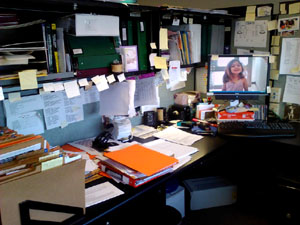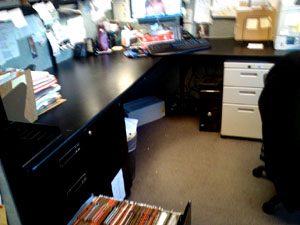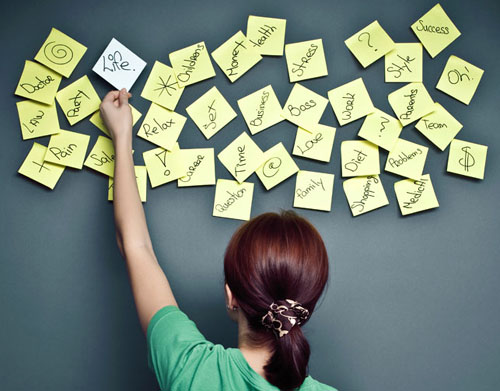One of These Days…
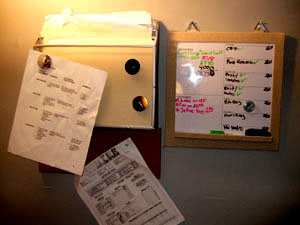
“When my work space, or my living space, is cluttered, my mind is cluttered.
There is no room for creativity, for moving forward…. and it feels so HEAVY!
When I get it all organized I am liberated, I feel light, and anything is possible.”
-Anonymous Organization Convert
Man, check out that spot! A White board with a week-day grid, a three-compartment hanging organizer which doubles as a magnet board and a wee corkboard underneath! I see three different colors of dry erase markers goin’ on! Who is this organizational superstar?
Okay, of course, he’s me.
That’s my little organization station. I hung it a few weeks ago, directly to my right, next to my desk in our upstairs library. I’ve wanted to organize my mornings for a long time and I finally did. My main reason was that my morning writing time is usually one hour or less, so it needed to be more focused. It became so, instantly. However, I put off organizing for at least months, maybe a year or two since I had the first impulse.
That “putting off time” intrigued me. Why? Why did I wait so long? As is my penchant, I did research, and I found that not many people talk about the question of why we don’t organize. Well, that sounded like a job for me. I’ll give you some reasons why to organize and some ideas on how, but we’ll also look at the people like myself, the quietly disorganized throng, and the thinking which goes on in our clutter-loving minds.
Organization Motivation
“My home is my living and my work space (freelancer).
Working on a project is always more pleasurable when not accompanied
by the uncertainty and stress that comes along with untidy and messy spaces.”
– Anonymous Organization Convert
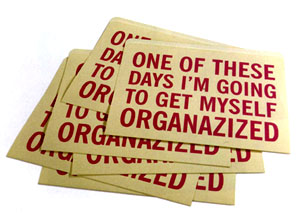 “An organized life begins with an attitude,” according to nationally syndicated finance columnist and journalist Janet Bigham Bernstel (and Stephen Windhaus) in their Ten Minute Guide to Getting Organized. “That attitude is commonly characterized by self-confidence, which results in self-control.” I like the concept that organization begins and ends with the inner-state of the organizer because it jives with the idea that our thinking is the largest reason most of us don’t organize.
“An organized life begins with an attitude,” according to nationally syndicated finance columnist and journalist Janet Bigham Bernstel (and Stephen Windhaus) in their Ten Minute Guide to Getting Organized. “That attitude is commonly characterized by self-confidence, which results in self-control.” I like the concept that organization begins and ends with the inner-state of the organizer because it jives with the idea that our thinking is the largest reason most of us don’t organize.
Bernstel and Windhaus assert that, no matter what you’re thinking about your life, your abilities, or “whether you’re aware of it or not, you want greater control of your life. Therefore, you must examine your level of self-confidence, recognize and nurture the characteristics of organization, and experience the positive merits that result from that effort.”
Elaine Shannon is a “leading expert in de-cluttering time and space issues for business owners, individuals and families across the globe.” She is co-host of a de-cluttering TV show and has written many articles on how (and why) to find your inner-organizer. Shannon also offers testimonials from Anonymous Organization Converts (my term) on her site. You can read some here. For more motivation, just click the links. She said of her own conversion, “I got organized because I had a child who required a calm home…if the house was chaotic so was he. Now years later we are ALL thriving in this environment. On a personal note, being organized has afforded me the time and the mental energy to do so much…I thank my son for that gift.”
I found the theme of thriving throughout my research, even in those not quoted here. Organization helps you feel calm, in control, empowered and able to accomplish both mundane tasks and complex projects faster and with less frustration. “It has a different name or meaning for each person,” Shannon said, “but at the end of the day it is happiness.”
Organization Procrastination
“I’m pretty organized — or I used to be. I feel like that part of my brain has atrophied.”
– Comedian Tina Fey
I’ve met this desk once before, years ago. I can hardly recognize it, now. I can hardly see it. This desk may spend more time with the person I love most than I do. This is my wife’s desk. Or, at least, this is the “before” picture. Coincidentally, she and I began discussing her organization needs while I wrote this piece. She agreed to share a bit of her story, complete with pictures. Suzanne would often feel “overwhelmed and distracted” while sitting at her desk, but felt like she needed to have “everything right in front of me” for fear of it being overlooked. I do a similar thing at my desk at the hospital. Though it’s one pile, not many, I hate that pile. We all do stuff like that, even though—on some level—we know it contributes to our stress and lowers our productivity.
In therapy we call the root of our impulse to do things which become damaging to ourselves a cognitive distortion. Stripped of all its clinical sparkle and applied to those of us will much less acute issues, it just simply means “wrong headed thinking.” We all suffer from wrong-headedness, especially me. Ask Suzanne.
What I like to do in therapy, to mitigate a cognitive distortion is engage in what I call a Disputation or Acknowledgement of the cause of the distortion. First you label the distortion, then you describe it, then you either dispute it and move on, or you acknowledge the core validity that has become twisted and you find a way to healthily address it.
This is surely not a complete list, and the core cause of the distortion may be more personal to you, but this will serve as a good example of the process. It’s hard to find one on this list that I haven’t at one time, had to look in the face and say “Really? What were you thinking?”
The Mole Hill Mountain – “I let it get too big.”
Acknowledgement:Yeah, maybe you did let it get bigger than it needed to be. However, the moment you start attacking your pile of disorder, the smaller it will become. You can outlast your clutter.
The Little Orphan Annie – “I’ll get organized tomorrow.”
Disputation: Tomorrow is too late. Continue Tomorrow, start today and you will feel better now.
The Time Twister – “I don’t even have time to get organized!”
Acknowledgement: Yes, part of the reason you’re disorganized is because it feels like you have no time. Bernstel and Windhaus dispute this one well; “…organizing life should be considered an opportunity for increased productivity and the related peace of mind associated with greater access to family, friends, and leisure time.” You will have more time, the more organized you are. Pick one small thing per day and stick to it.
The Wet Dish Towel – “I’m just too tired.”
Acknowledgement: Yes, you are tired. However, tiredness is a physical thing. You can solve that with a nap. A disorganized house, or desk that makes you tired is an emotional thing. It has you defeated. Fight back! Pick one battle and win that. Look at it every time you feel tired. Lisa Zaslow, Founder and Organization and Productivity expert of Gotham Organizers encounters this issue all the time. She advises to “Start with an area in your home or office where you will see results quickly. I like to direct people to their kitchen junk drawers.”
The Monkey on Your Back – “But I may need this some day!”
Acknowledgement: Yes, you may. However, how much money are you saving keeping it, and how much stress is it causing seeing and storing it? One of Shannon’s Organization Converts testified that “When I purge [my old junk], I feel like a weight is lifted off my shoulders,” and it’s so true. Shannon herself acknowledged that “This is the hardest part for most people. To make the decision easier ask yourself when you are stuck on an item. ‘Is this part of my current life and is it useful or beautiful?’ Thinking of others who are less fortunate will help you to let go.”
The Self-Destroying Legacy – “I’ve just never been an organized person.”
Disputation: And John Glenn had never been an astronaut before he was. Organization isn’t a biological trait like green eyes. It’s a learned, practiced skill that even monkeys (well, some monkeys) can do. As a strong aside, any statement in which you tell yourself “I’ve just never been…” should be critically examined for validity, harvested for a kernel of change, then punched squarely in the face.
The Fire Extinguisher – “How Can I justify organizing when all this needs to be done?!” Suz and I both fall prey to this one often.
Acknowledgement: Yes, you do have important things to accomplish. However, you will accomplish more of them when you are organized, and you will have more confidence and concentration with which to attack.
There is Suzanne’s desk after some time spent organizing. See the file drawer proudly open to display files that will still be acted upon, but are now not weighing down her desk? She says she feels more at ease and together. That’s what it’s all about.
Organization Realization
“I’m a clean freak. I get really excited when things are clean, and I love sorting stuff.
I love folding laundry in front of the television.”
– Actress Christina Ricci
“How you re-organize everything is incredibly personal,” according to Shannon. That is the main reason why I’m not spending much time on a “How to.” That, and the 221,000,000 articles returned when I googled “How to get organized.” Have fun searching and find one that fits. Here are two good plans of the many that I came across. There are some similarities, which is a common trait in organization plans.
Elaine Shannon’s Six Steps
1. The Dream – How do you envision your new dream space or system?
2. The Plan – What steps will you take to make the dream come true?
3. The Sort – Sort through everything, putting like with like, into categories.
4. The Purge – Deciding what to keep and what to let go of.
5. The Re-Organization – Put what you are keeping back, making sure everything has a home.
6. Maintenance – Keep it up.
Lisa Zaslow’s plan had the best tip for storing things. “Keep in mind your “prime real estate” which are the spaces most accessible to you—between your shoulders and knees—and store things where they are used.” I didn’t know that was where my prime real estate was, but it makes sense.
Step 1: Commit to Organization
Step 2: De-clutter
Step 3: Group Like with Like
Step 4: Create a Place for Everything
Step 5: Maintain Organization
As Shannon put it, much like everything in life, “Organizing isn’t a one time project. It’s an evolving journey, one destination leading to the next.” So have fun getting to the destination with more serenity, confidence and increased ability to find the remote, your keys, your socks, your floor…

